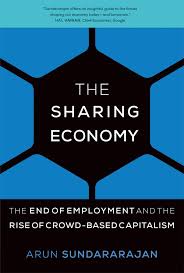While giving someone a ride, running errands or having a guest to stay in your spare room might be something you offer a friend for free, these are becoming the basis of a range of services increasingly provided to strangers in exchange for money. In The Sharing Economy: The End of Employment and the Rise of Crowd-Based Capitalism, Arun Sundararajan explores this new ‘sharing economy’ based on peer-to-peer commercial exchange. Although the book provides a wealth of interesting detail in accounting for the historical emergence of ‘crowd-based capitalism’, Christopher May argues that it obscures the real impact of the changes it posits on workers as well as the potential intensification of economic insecurity and inequality that may be brought about by the ‘sharing economy’.
The Sharing Economy: The End of Employment and the Rise of Crowd-Based Capitalism. Arun Sundararajan. MIT Press. 2016.
 We’ve had post-Fordism; we’ve seen the rise of the new economy; and now we are confronted with the ‘sharing economy’. In The Sharing Economy: The End of Employment and the Rise of Crowd-Based Capitalism, Arun Sundararajan aims to explain both the origins and the implications of this new way of working, and how the ‘asset-light’ generation’s political economy is shaped by ‘sharing’.
We’ve had post-Fordism; we’ve seen the rise of the new economy; and now we are confronted with the ‘sharing economy’. In The Sharing Economy: The End of Employment and the Rise of Crowd-Based Capitalism, Arun Sundararajan aims to explain both the origins and the implications of this new way of working, and how the ‘asset-light’ generation’s political economy is shaped by ‘sharing’.
For Sundararajan, the sharing economy is largely market-based, allows capital (material and virtual) to be used more fully, is based on crowd-based networks facilitated by platforms and, perhaps most significantly, blurs the lines between the personal and professional as well as between various forms of employment. He notes that ‘sharing economy’ may not be the best term; though using it due to its ubiquity, he prefers ‘crowd-based capitalism’ which he sees as ‘an interesting middle ground between capitalism and socialism’ (44): a claim to which I will return!
Sundararajan’s historical account of the sharing economy goes back to the establishment of eBay, Craigslist and other selling/contact sites; however, the key development was the subsequent ‘digitisation of trust’ which allowed one-off market exchanges to benefit from the reputational aspects of repeated interactions via peer-to-peer evaluations. Arguing that the long-term general urbanisation of the global political economy has promoted the condition for ‘sharing’, Sundararajan also picks up cues from various analysts of the information society/economy, sharing their breathless impatience with the past, seeing the future as nearly here. Soon the distinction between market and hierarchy will dissolve (as it has for digitised platforms), leaving a mesh/complex of continuing interactions that will reduce the fixity or specificity of assets, allowing them to be used more efficiently than when locked up in hierarchies (firms). At its most fully developed, this leads to blockchain technologies, most famously underpinning Bitcoin, where interactions are recorded in the code of the asset, not even requiring a platform to facilitate the ‘sharing’.
 Image Credit: (Mark Warner, CC 2.0)
Image Credit: (Mark Warner, CC 2.0)
Having set out how the new crowd-based capitalism might be organised, the book’s second half explores its likely effects. Sundararajan summarises these as increasing the impact of capital (enhancing its utilisation); the fragmentation of consumption with an increase in choice expanding uptake of goods and services; a shift away from economies of scale towards network effects; and the ‘democratisation of economic opportunity that promises inclusive growth’ (108). He then considers how preceding economic regulations might fit this new sharing economy, recognising that many of the issues remain the same. However, self-identifying as an economist, Sundararajan sees regulation’s benefits narrowly, only encompassing information asymmetries and un-costed externalities. These, he argues, can be dealt with in a sharing economy via peer-to-peer and brand-based reputational regulation alongside self-regulatory systems. In this lightly regulated market, a form of spot market for flexible independent contractors will revolve around tasks, often referred to as the ‘gig economy’. That this will (and indeed does) prompt considerable volatility in earnings, social benefits and welfare prompts Sundararajan to explore and support some form of universal basic income, while noting that there might be some difficulties funding it.
Professor at the Stern School of Business, NYU, Sundararajan is a self-avowed enthusiast for the sharing economy, but the ‘advantages’ he identifies might look rather different to many Uber-drivers in New York City. Therefore, while Sundararajan presents an interesting and highly detailed discussion of the sharing economy (including a wide range of examples, mainly but not exclusively drawn from the USA), like many digital idealists before him he does not recognise continuities with modern capitalism. Rather, he regards the sharing economy as a move towards a new mid-ground between capitalism and socialism. If socialism is about addressing inequalities and the socialisation of the means of production, then Sundararajan’s argument sadly does not stack up against the sharing economy’s real social relations.
At the heart of the book is the idea that a technological fragmentation of the previously more hierarchical economy will facilitate expanded opportunities for individuals to enhance their earning capacity and/or to become demi-rentiers if they have under-used but in-demand assets. Although Sundararajan manages to effectively downplay any technological determinism, it still underpins much of his argument; as such, he ignores a key element to the processes of outsourcing that feed the growth of this sharing economy. As William Milberg and Deborah Winkler (2013) have pointed out, outsourcing is facilitated and driven by financialisation alongside technological developments; financialisation is an agent-centred process prosecuted by financial and banking corporations in the USA and elsewhere. So like all good political economists, we should ask: who benefits from the sharing economy? A recent post from Branko Milanovic is particularly apposite: he observes that Gerald Davis has demonstrated that large hierarchical firms end up equalising rewards and benefits as large social systems seeking to maintain legitimacy, while based fragmentation of these hierarchies via outsourcing allows much smaller groups to capture rewards and exposes contractors to more voracious price competition for their labour.
Overall then, Sundararajan joins a long history of technological utopians who either willfully ignore, or have little interest in, the actual economic relations they are examining. Certainly, this book has a wealth of detail, but it mostly misses the real impact of the changes it posits on workers. Sundararajan’s sharing economy is not a new development but rather a revival of the share-cropping, insecure and brutal economy of the nineteenth century, which social democracy did much to (incompletely) alleviate in the last century. While this book may play well in Silicon Valley, the ‘freedoms’ of the sharing economy look a lot like Anatole France’s observation that the rich and poor are equally free to sleep under bridges.
Sundararajan recognises this might be an issue when he muses on universal income and other non-market welfare support for contractors (as also recently proposed by left-leaning US Senator Elizabeth Warren), but his acceptance that this might be politically difficult to establish does nothing to dampen his enthusiasm for the sharing economy. Unfortunately, the sharing economy seldom merely represents a little extra spending money to supplement an otherwise stable income; for most, this new economy threatens only to intensify the insecurity and inequality of their economic lives, and Sundararajan’s book would have been much better if this future had been more central to his account of the sharing economy’s likely political economy.
This review originally appeared at the LSE Review of Books.
Please read our comments policy before commenting.
Note: This article gives the views of the authors, and not the position of USAPP– American Politics and Policy, nor of the London School of Economics.
Shortened URL for this post: http://bit.ly/1UM3EGL
——————————————–
Christopher May – Lancaster University
Christopher May is Professor of Political Economy at Lancaster University, UK. His most recent book is Global Corporations in Global Governance (Routledge, 2015) and he is currently editing The Edward Elgar Research Handbook on The Rule of Law (2017). He has published widely on the interaction between law and political economy, wrote the first independently authored study of the World Intellectual Property Organisation and some years ago wrote The Information Society: A Sceptical View (Polity Press, 2002). Read more reviews by Christopher May.






